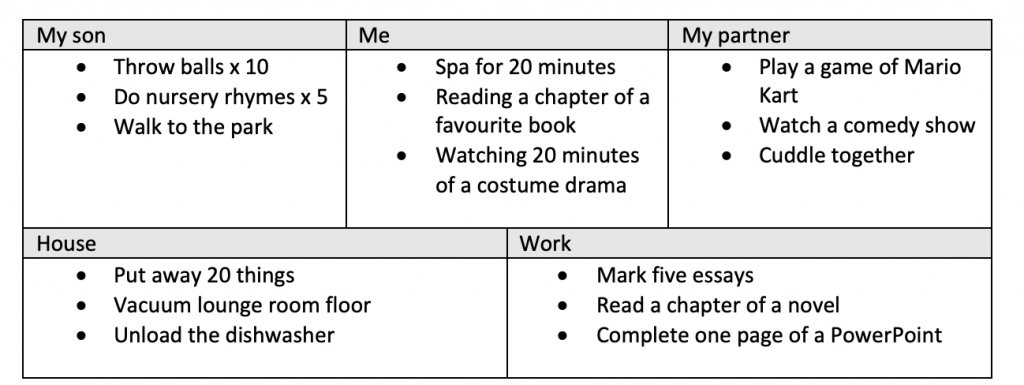By Rachel Town
“We need to go to the OT on Tuesday. You can take him then, because you finish work early.”
“We still need to book in the physio.”
As any parent of a child with additional needs knows, the difficulties of scheduling key dates and appointments can quickly lead to frustration, stress and the discovery of the joys of a bottle of wine. It becomes the impossible dream to organise anything after a while.
Organising time
Now, when I talk about organising time, I wish I could say that I knew of some miraculous app or calendar that would somehow take my schedule, my husband’s schedule and my son’s appointments and made them all magically match up, but I don’t believe anything like this exists yet. If it does, please let me know!!!
The ‘go to’ for most of us in organising our life is the never-ending and often dreaded ‘to-do’ list… Almost everyone has written one at some point or another, listing all the jobs we have to do around the house, or tasks for our role at work. I have a slightly different way of approaching this – one which allows me, at least, to organise my time where I sit down with a piece of paper and create a simple table of what is important to me. I can then organise my time and give equal weighting to all parts of my life.
I am a full-time teacher, with a husband who also works, while my eight year old son has ASD, and intellectual disability and is nonverbal. Therefore, I generally organise my to-do list to focus on five areas: my son, my partner, my house, my job and me. When I include each task on this list, I try to make it short and easy, so I have got a better chance of getting it done. Then as I move through the day, I try to make sure I take a task from each category, so that by the end of the day, even if I haven’t done everything, I have done a little bit of everything for each key area.
So it my list may look something like this:

If you create your own to-do list you will probably have different categories, with different areas that are important to you; you just need to consider what is important for your life and how you include it in your time.
The following is the reasoning behind my 5 categories:
My son
My son is hugely important to me and like most parents of a child with additional needs, I often need to consider how to prioritise him and his needs. Though it is important to organise therapy appointments and activities for him, it is also important to schedule time for him each day. It can be far too easy to get distracted when you get busy with cooking meals or cleaning the house to spend time on little activities that help to build connections with him. As my son cannot talk, many of these activities revolve around physical activities.
Partner
Having a disabled child can put a significant pressure on any relationship. Becoming a parent is often difficult, requiring a transformation from being a carefree relaxed individual who only needs to think of themselves to having to consider the needs of someone else for every minute of every day. This becomes more difficult when you have a child who does not reach milestones in the same way as others, whose life involves more struggle and challenge. If you have a partner, it is important to take small moments to maintain your relationship. My husband and I like playing board games, video games and watching comedy shows together, so we often take moments to do these together.
Work
Working is incredibly important to me. I enjoy the challenge of intellectual pursuits teaching senior subjects and also the social experience of interacting with other teachers and students. Not every parent may work, and often with a child with additional needs this can add further challenges to undertaking paid work. It is often nice though, to have something that allows you to have interactions outside of your family and your home, whether it is volunteering, studying or meeting up with others. I often list a mix of work tasks I am less interested in like marking essays, with ones I am more interested by, like reading the English novels.
Me
I think the biggest problem with organising time, is that when we start to focus on all the things that we need to do with our time, it is far too easy to forget ourselves and what we need. Focusing on ourselves is not about being selfish, but is a simple recognition that sometimes we need to recharge and look after our own needs, before we can look after the needs of others. It is incredibly important to consider ourselves, given the stressors we will face each day.
House
The funny thing is that when we start to write a to-do list, we often focus first on jobs around our house. Yet it is important to remember that when we reached the end of our lives, we will not be thinking about how much time we spent cleaning our house. Instead, we would think about the people we spent time with and the activities that brought us joy. This doesn’t mean that we shouldn’t clean our houses but that sometimes we need to consider what we need more. It can also mean doing a little bit regularly, to slowly chip away at tasks, rather than trying to do it all at once. Sometimes these activities can be something we do with our kids or partners, like unloading the dishwasher together, to open up more moments for connection.
Exploring boundaries
What we say ‘yes’ to and what we say ‘no’ to also has a significant impact on our precious allocations of time.
The joy of saying ‘Yes’
Many times as the parent of a child with additional needs it’s too easy to say ‘no’ to activities, seeing them as things that place additional stresses on our life. My son is not aware of the dangers of roads and can often attempt to abscond and it would be very easy for me to say no to every suggestion to catch up, to stay in the safe cocoon of my house, where fences surround him. However, it is important to recognise that I need social contact, as much as I need for him to feel safe. To make myself feel more joyful about saying ‘yes’, I think about ways that I can get both needs met. The easiest way is to have conversations to explain what can help you say ‘yes’.
- Suggesting a place that I feel comfortable. This could be:
- A play centre for kids who have additional needs. Often these are a great place to meet other parents as well. I often go to My Puzzle House and I believe We Rock the Spectrum is quite good too.
- A play ground that is fully fenced. This can be a great opportunity to watch the kids play, though I often end up chasing my child, more than I get to catch up.
- Going to other people’s houses can work, if I bring important supplies. This could be:
- Bringing fidget toys and chewys to help with their emotional regulation.
- Bringing an iPad, toy or book that they like to help give them a comfortable thing to focus on.
The need to say ‘No’
On the flipside of this, it is also important to recognise that we can and should say ‘no’ to activities without feeling like we aren’t letting people down. Sometimes life comes with more challenges when you are a parent of a child with special needs and it is important for our own time management to recognise that we can say no if we need to. Sometimes it is good to ask ourselves:
- Is this something I really want to do, or am I doing it because I feel like I should?
- Is this something essential or is it not necessary?
- Is this time for this activity convenient or would it better to change to another time?
- Is this activity going to make life harder for me and my child without giving us any benefits?
Even though it can be terrifying to say ‘no’, especially if you suffer from FOMO (Fear of Missing Out), it is important to consider yourself and your child and what you need at that time.
Nobody can do everything and it is important to recognise your own limitations so you can organise what you need to do and keep those wheels turning!




